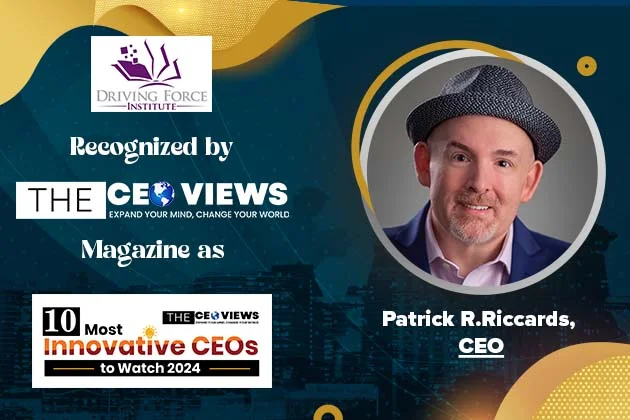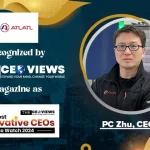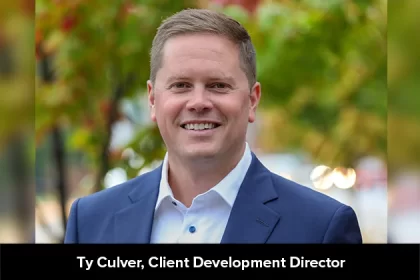Patrick R. Riccards is the Founder and CEO of the Driving Force Institute. He is an inspirational leader and throughout his career, he has been a strong advocate for mission–driven organizations. Over the past ten years, he has played a key role in launching new organizations, improving existing ones, and transforming struggling organizations with strong missions. Patrick always approaches his work with a focus on public engagement.
He understands the power of informing key stakeholders, building momentum for solutions, and mobilizing communities to achieve goals. This approach has been successful in various sectors, including healthcare, technology, education, workforce development, social services, and media.
Patrick emphasizes the importance of believing in the mission, the people, and the expected outcomes in any content area. He also stresses the need for team members to understand not only what they are doing but also why they are doing it. The “why” is what separates a good idea from a successful organization.
We had the privilege of speaking with Patrick R. Riccards, the accomplished Founder and CEO who plays a pivotal role in Driving Force Institute. Let’s delve into his insights and experiences, uncovering the strategies that have led to his success and the valuable lessons he can share with us.
How Driving Force Institute evolved and made a mark in the previous years?
In less than four years, the Driving Force Institute has become one of the largest producers of American history education videos in the country, creating more than 500 short films that are now reaching 50 million users.
From the beginning, we recognized there is immense. power in short–form films. The average 16–year–old spends more than two hours a day watching 64 unique segments on platforms like YouTube and TikTok. They are hungry for information, turn to video first for it, and are constantly seeking content that is relevant to them. That’s what DFI focuses on. We set out to show that American history could be interesting and relevant to any learner. We focused on the untold stories in history, the people, places, events, and artifacts that connect with today’s learners but are largely left out of the textbooks. Through our films, we are looking to spark interest and curiosity in learners. We want to turn them into critical thinkers and to be contributing members of our civil society. That is a lot to expect from a two-minute film, but we are doing it.
What are your biggest failures professionally? What have you learned from them, and what would you do differently?
I am a big believer in a “learn–from–failure” mindset. Early on in my leadership career, I did everything possible to ensure that we did not fail. I quickly learned that it is impossible to avoid failure if you are innovating and trying to do things others haven’t tackled. I also realized how important failure is in the development process. We will make plenty of mistakes along the way, but as long as we are transparent about it and learn. from it, we will benefit from it.
The Driving Force Institute only exists because of its previous failures. I started the work by incubating DFI at a national operation foundation that didn’t see the value of the work or the potential it would have in shaping a nation of learners. When DFI then launched as an independent company, we envisioned our short films would be shared virally by learners, failing to understand that no 16-year-old wants to take to social media to tout this great history video they just watched. I failed to initially understand our audience and how best to connect our products to that audience. So, we quickly pivoted, creating films for learners. that are embraced by educators. Instead of distributing virally, we focused on licensing and distribution partnerships. That’s how we have 50 million users today.
We fail fast, we fail forward, and we learn from all of our setbacks. That philosophy has made us a successful organization and it has helped me develop into an effective leader.
We fail fast, we fail forward, and we learn from all of our setbacks. That philosophy has made Driving Force Institute a successful organization and it has helped me develop into an effective leader,’ Patrick R. Riccards.
What innovative learning methods have you designed and incorporated to improve American history instruction?
In addition to creating short–form films, each about two minutes in length, for our learners, we have also developed a comprehensive professional development video series of teachers, helping them understand how to best use multimedia in the classroom. Gone are the days when teachers could simply pop a 45–minute video into the AV cart and hold a learner’s attention once the lights go off. Until schools of education ensure that every classroom teacher understands how best to use media in their classrooms, we have an obligation to help teachers maximize the resources available to them. DFI’s Untold History series was created, in large part, because teachers across the country told us they were hungry for relevant video content that could connect with the learner. We are producing that. Now we need to make sure that every teacher knows how to use these short films to spark the learning process.
Our commitment to short-form films has also produced some unexpected learning benefits. Because of DFI, even struggling readers can explore American history. and participate in the sort of classroom discussions necessary to develop the critical thinking we seek from today’s learners. Low literacy skills shouldn’t prevent one from learning about the past and connecting with our history. Thanks to Untold History, those struggling readers can still be active students of history.
How does your institute compete and differentiate itself from others?
DFI is not the first company to be using video as a teaching tool, and we certainly won’t be the last to do it. But we use short films in a different way than many others. Our content is intended to spark discussion, debate, and deep thinking. We embrace some of the darkest and most controversial moments in American history, knowing that the complexity and truth of those events are essential to effective history education. If a learner believes the history is being whitewashed or they are only being told part of the truth, they will immediately tune out. We believe they can handle all of American history, and each day we see students embracing the realities that have long been left out of the textbooks.
DFI is unmatched in treating learners like adults. They determine what interests them. They determine how deep they want to dig. They determine what matters. We simply present the learning tools that are necessary to connect learners to American history, seeking to make it interesting and relevant to all who study it.
What are your advice and tips for emerging leaders?
The most important question you can ask and answer is the why. The Why turns a potential idea into a thriving company. The Why builds a successful team that understands the mission and their role in meeting it. The Why allows you to achieve your goals and connect with your audiences.
I believe in my mission, my team, my product, and my metrics. Others believe in me because I can answer The Why. My Why comes from learning from past setbacks. It comes from taking audacious, yet calculated, risks. It comes believing in myself and my team. The Why becomes an entrepreneurial leader’s North Star. Find it, focus on it, and you will always reach your destination.
Patrick R. Riccards stands as an exemplar of visionary leadership with unwavering dedication, strategic acumen, and a commitment to excellence
Patrick previously served as CEO of the Connecticut Coalition for Achievement Now, executive director at the American Institutes for Research, a university vice president, and CEO and chief strategist for Exemplar Strategic Communications. Patrick began his career working on Capitol Hill.
Currently on the Board of Directors for the Center for the Collaborative Classroom and the advisory board for the Education Writers Association, Patrick also was a former local school board chairman. An award-winning author, he writes and tweets under the handle Eduflack.
Patrick is the author of two award-winning books – Dadprovement and Dad in a Cheer Bow. He is also the editor of Why Kids Can’t Read: Continuing to Challenge the Status Quo in Education and the recently published, Why History Matters: American History Educators Speak Out, a volume of essays from award-winning social studies teachers on the importance of learning U.S. history.










